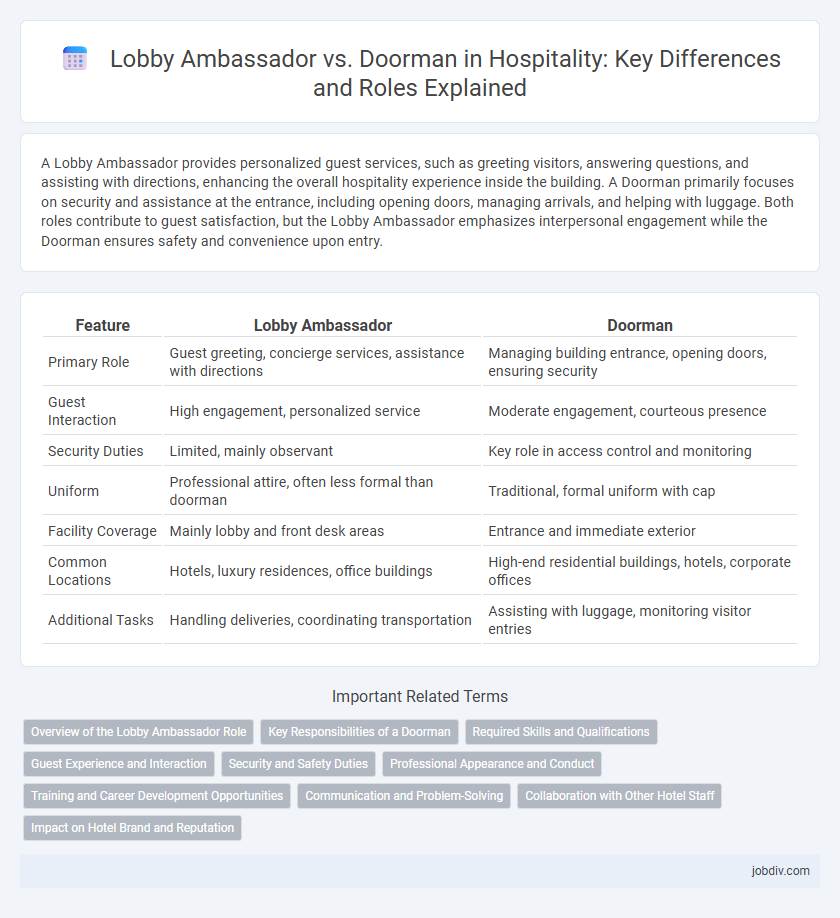A Lobby Ambassador provides personalized guest services, such as greeting visitors, answering questions, and assisting with directions, enhancing the overall hospitality experience inside the building. A Doorman primarily focuses on security and assistance at the entrance, including opening doors, managing arrivals, and helping with luggage. Both roles contribute to guest satisfaction, but the Lobby Ambassador emphasizes interpersonal engagement while the Doorman ensures safety and convenience upon entry.
Table of Comparison
| Feature | Lobby Ambassador | Doorman |
|---|---|---|
| Primary Role | Guest greeting, concierge services, assistance with directions | Managing building entrance, opening doors, ensuring security |
| Guest Interaction | High engagement, personalized service | Moderate engagement, courteous presence |
| Security Duties | Limited, mainly observant | Key role in access control and monitoring |
| Uniform | Professional attire, often less formal than doorman | Traditional, formal uniform with cap |
| Facility Coverage | Mainly lobby and front desk areas | Entrance and immediate exterior |
| Common Locations | Hotels, luxury residences, office buildings | High-end residential buildings, hotels, corporate offices |
| Additional Tasks | Handling deliveries, coordinating transportation | Assisting with luggage, monitoring visitor entries |
Overview of the Lobby Ambassador Role
The Lobby Ambassador serves as the primary point of contact for guests, ensuring a warm and professional welcome while managing concierge services and guest inquiries. This role emphasizes personalized guest interaction, coordination of arrivals and departures, and maintaining an organized lobby environment. Unlike a Doorman, who primarily handles valet and entry duties, the Lobby Ambassador focuses on enhancing the overall guest experience inside the hotel lobby.
Key Responsibilities of a Doorman
A doorman in hospitality primarily ensures guest safety by monitoring entrances, assisting with luggage, and providing a welcoming presence at the hotel's main entry. They manage guest arrivals and departures, facilitate smooth access for visitors, and maintain a secure environment by monitoring suspicious activities. Doormen also coordinate with valet services and concierge staff to enhance overall guest experience and operational efficiency.
Required Skills and Qualifications
Lobby Ambassadors require strong communication skills, customer service expertise, and proficiency in multitasking to manage guest inquiries and coordinate with hotel staff effectively. Doormen need excellent physical stamina, a polished appearance, and the ability to handle luggage while greeting guests with a welcoming demeanor. Both roles demand professionalism, attention to detail, and the capacity to create a positive first impression in luxury hospitality environments.
Guest Experience and Interaction
A Lobby Ambassador enhances guest experience by providing personalized welcomes, assisting with directions, and managing guest inquiries, creating a warm and attentive environment. In contrast, a Doorman primarily focuses on opening doors, handling luggage, and ensuring guest safety, offering a more traditional and functional interaction. Both roles contribute to first impressions, but the Lobby Ambassador emphasizes engagement and hospitality, while the Doorman prioritizes security and convenience.
Security and Safety Duties
Lobby Ambassadors and Doormen both contribute to security and safety in hospitality settings, but their roles differ significantly. Doormen primarily control access to the premises, monitor for suspicious activity, and ensure only authorized individuals enter, acting as a first line of defense against potential security threats. Lobby Ambassadors focus on interior safety by managing guest flow, assisting in emergency protocols, and maintaining a visible presence that deters misconduct within the lobby area.
Professional Appearance and Conduct
Lobby Ambassadors maintain a polished, approachable demeanor with refined uniforms that emphasize hospitality professionalism, while Doormen wear distinct, often formal attire designed to signify security and assistance. Lobby Ambassadors prioritize warm, welcoming gestures and proactive guest engagement, reflecting a service-oriented conduct. Doormen exhibit a composed, ritualized presence, focusing on respectful greetings and the seamless transition of guests, reinforcing both safety and courtesy.
Training and Career Development Opportunities
Lobby Ambassadors receive specialized training in guest relations, communication, and concierge services, enhancing their skills for diverse hospitality roles. Doormen undergo rigorous safety, security, and protocol training, positioning them for advancement in security management and operational leadership. Both roles offer structured career development programs tailored to strengthen expertise and promote upward mobility within luxury hotel and residential properties.
Communication and Problem-Solving
Lobby Ambassadors excel in proactive communication, greeting guests warmly and providing personalized assistance to enhance the hospitality experience. Doormen specialize in managing entry logistics and security, addressing challenges such as crowd control and ensuring safety with clear, authoritative communication. Both roles require strong problem-solving skills, but Lobby Ambassadors prioritize guest rapport while Doormen focus on operational efficiency and incident response.
Collaboration with Other Hotel Staff
Lobby Ambassadors collaborate closely with front desk agents and concierge teams to ensure seamless guest check-ins and personalized service, enhancing the overall guest experience. Doormen coordinate with bellhops and security personnel to manage guest arrivals and maintain safety, facilitating smooth and secure access to the hotel. Both roles rely on effective communication with housekeeping and maintenance staff to promptly address guest needs and uphold service standards.
Impact on Hotel Brand and Reputation
Lobby Ambassadors create a personalized guest experience through warm greetings and proactive service, significantly enhancing the hotel's brand image and fostering positive word-of-mouth. Doormen contribute to first impressions by providing a visible security presence and assisting with luggage, reinforcing the hotel's reputation for safety and professionalism. Together, these roles strategically elevate guest satisfaction and establish a strong, memorable brand reputation in the competitive hospitality market.
Lobby Ambassador vs Doorman Infographic

 jobdiv.com
jobdiv.com